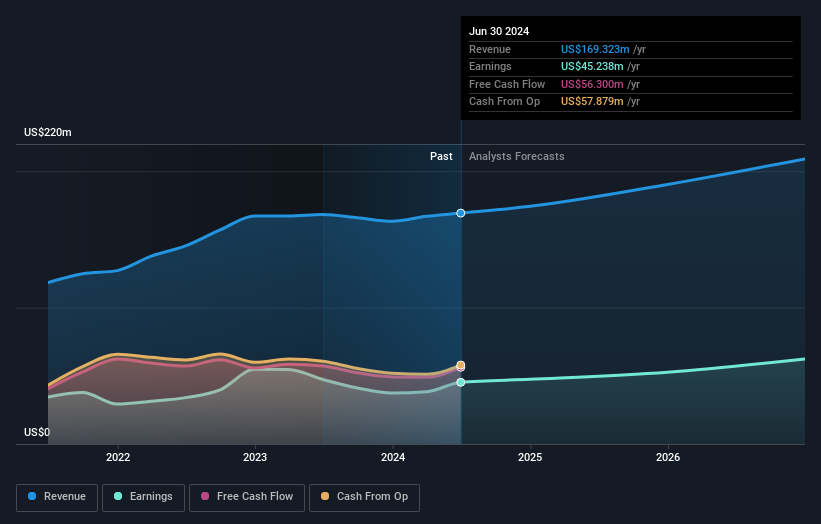Mid Penn Bancorp, Inc. (NASDAQ:MPB) surges 10%; retail investors who own 50% shares profited along with institutions
Key Insights
- Significant control over Mid Penn Bancorp by retail investors implies that the general public has more power to influence management and governance-related decisions
- 39% of the business is held by the top 25 shareholders
- Recent purchases by insiders
Every investor in Mid Penn Bancorp, Inc. (NASDAQ:MPB) should be aware of the most powerful shareholder groups. The group holding the most number of shares in the company, around 50% to be precise, is retail investors. Put another way, the group faces the maximum upside potential (or downside risk).
While retail investors were the group that benefitted the most from last week’s US$49m market cap gain, institutions too had a 44% share in those profits.
Let's delve deeper into each type of owner of Mid Penn Bancorp, beginning with the chart below.
View our latest analysis for Mid Penn Bancorp

What Does The Institutional Ownership Tell Us About Mid Penn Bancorp?
Institutions typically measure themselves against a benchmark when reporting to their own investors, so they often become more enthusiastic about a stock once it's included in a major index. We would expect most companies to have some institutions on the register, especially if they are growing.
We can see that Mid Penn Bancorp does have institutional investors; and they hold a good portion of the company's stock. This can indicate that the company has a certain degree of credibility in the investment community. However, it is best to be wary of relying on the supposed validation that comes with institutional investors. They too, get it wrong sometimes. When multiple institutions own a stock, there's always a risk that they are in a 'crowded trade'. When such a trade goes wrong, multiple parties may compete to sell stock fast. This risk is higher in a company without a history of growth. You can see Mid Penn Bancorp's historic earnings and revenue below, but keep in mind there's always more to the story.

Mid Penn Bancorp is not owned by hedge funds. BlackRock, Inc. is currently the largest shareholder, with 7.2% of shares outstanding. The Vanguard Group, Inc. is the second largest shareholder owning 4.4% of common stock, and Wellington Management Group LLP holds about 3.3% of the company stock.
A deeper look at our ownership data shows that the top 25 shareholders collectively hold less than half of the register, suggesting a large group of small holders where no single shareholder has a majority.
Researching institutional ownership is a good way to gauge and filter a stock's expected performance. The same can be achieved by studying analyst sentiments. There is a little analyst coverage of the stock, but not much. So there is room for it to gain more coverage.
Insider Ownership Of Mid Penn Bancorp
The definition of company insiders can be subjective and does vary between jurisdictions. Our data reflects individual insiders, capturing board members at the very least. Management ultimately answers to the board. However, it is not uncommon for managers to be executive board members, especially if they are a founder or the CEO.
Most consider insider ownership a positive because it can indicate the board is well aligned with other shareholders. However, on some occasions too much power is concentrated within this group.
Our most recent data indicates that insiders own some shares in Mid Penn Bancorp, Inc.. In their own names, insiders own US$33m worth of stock in the US$527m company. This shows at least some alignment. You can click here to see if those insiders have been buying or selling.
General Public Ownership
The general public-- including retail investors -- own 50% stake in the company, and hence can't easily be ignored. While this group can't necessarily call the shots, it can certainly have a real influence on how the company is run.
Next Steps:
I find it very interesting to look at who exactly owns a company. But to truly gain insight, we need to consider other information, too. For instance, we've identified 1 warning sign for Mid Penn Bancorp that you should be aware of.
But ultimately it is the future, not the past, that will determine how well the owners of this business will do. Therefore we think it advisable to take a look at this free report showing whether analysts are predicting a brighter future.
NB: Figures in this article are calculated using data from the last twelve months, which refer to the 12-month period ending on the last date of the month the financial statement is dated. This may not be consistent with full year annual report figures.
Have feedback on this article? Concerned about the content? Get in touch with us directly. Alternatively, email editorial-team (at) simplywallst.com.
This article by Simply Wall St is general in nature. We provide commentary based on historical data and analyst forecasts only using an unbiased methodology and our articles are not intended to be financial advice. It does not constitute a recommendation to buy or sell any stock, and does not take account of your objectives, or your financial situation. We aim to bring you long-term focused analysis driven by fundamental data. Note that our analysis may not factor in the latest price-sensitive company announcements or qualitative material. Simply Wall St has no position in any stocks mentioned.
 Index Options
Index Options CME Group
CME Group Nasdaq
Nasdaq Cboe
Cboe TradingView
TradingView Wall Street Journal
Wall Street Journal